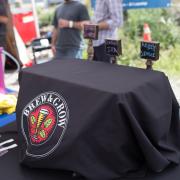Hey Guys-
I'm of the opinion that Chicago's tap water tastes like ass, at least where I am by River North. So, I've been using bottled water in my brews, but that's expensive. Does anyone treat their tap water? Can you even really taste the difference once it's beer?











yeah.....i notice a difference...but i also use ro water...which is stripped of most calcium. I use teaspoon of gypsum for hoppy beers...and a teaspoon of calcium carbonate for malty beers......and i think they have improved a lot from my additions.
I hear a teaspoon of gypsum is a great way to improve hop flavor in a beer. Do you taste a difference between brews where you use gypsum and brews where you do not?
i use ro water from Dominicks........i get one of those 5 gal jugs filled pretty cheap.....and then top it off with 2 gal of distilled.......i usually add a little gypsum ....its a pain in the ass....but it tastes great
here is a Chicago water report...formatting is a little goofy (and im not clear what year this was from), but it lists all the vitals. Mineral wise, Chicago water is good for brewing most styles. There are certain styles such as stouts and pilsners that require certain minerals to get authentic flavor. Those guys are the odd balls, with drastic mineral profiles....and the same reason why London doesn't make a pils; and Czech doesn't make stout. The water profiles in those locations are what give the styles brewed there the unique character that we expect. That being said, you can add salts or gypsum, etc to your brews to achieve that style's profile. You just have to adjust our relatively neutral water profile....which ive never done (with exception of adding "Burton salts" to a stout...straight from a pre-weighed package).
As far as the chlorine and other goofy flavors....a filter is a great way to treat your water. Im not clear though if it strips minerals or not. Campden tablets are another way to treat for chlorine, I think Palmer covers this in his book "How to brew". anyways here is the report:
Chicago Water Profile
Dilution % 0 10 20 30 40 50 60 70 80 90
Ca 35 32 28 25 21 18 14 11 7 4
Mg 13 11 10 9 8 6 5 4 3 1
Na 8 7 6 6 5 4 3 2 2 1
Cl 13 12 10 9 8 7 4 4 3 1
SO4 29 26 23 20 17 14 11 9 6 3
CaCO3 99 89 79 69 60 50 40 30 20 10
RA 67 60 53 47 40 33 27 20 13 7
Chloride to Sulfate Ratio
0.46
if someone can find a better, and dated report...please do :) Also, in the future maybe we can do this an expierment for the club. Do a group brew...one using untreated water, a second using just carbon filtered water, and third using unfiltered mineral adjusted water, and a final fourth doing filtered and mineral adjustments.
I have no doubt that Chicago tap water is good for some styles (not really sure which ones) but as far as brewing any classic styles I would say it's no good. I can't imaging any "classics" were brewed with Cook County municipal water. But with the filter, it certainly gives me the option to filter out a lot of stuff and add my own in the amount I want. But an experiment would be beneficial.
Just as some people split a single batch into two and use two different yeasts to taste the outcome, has anyone indeed intentionally altered the water chemistry (or used two different waters) to taste the effects? I've been reading "Designing Great Beers" by Ray Daniels and he explains the different ingredients (including water) for each type of beer. He explains that one of the brown ales is specific to London because of its water chemistry. Perhaps using straight Chi-Town tap water will yield a noticeably different (or better? or worse?) beer than ultra-filtered water?
I use a 10 inch solid carbon counter-top filter for drinking and brewing (beer, coffee and tea.) You can get anywhere from 10 to 1 micron filters and the difference is huge. We used a brita filter for over a year but got sick of how long it took to fill the pitcher so I started doing research and found that brita and pur filters are not solid carbon so they allow for chanels to form and the water to not filter at all (think just dumping your sparge water back into the mash instead of being gentle and allowing the grains to create a good filter.) The solid carbon ones for the counter (they have under the sink models) filters out a ton of stuff, has a great flow rate, only needs to be replaced every 5,000 gallons and only costs $10. Just go to amazon and look up the watts counter-top water filter... some of the best $30 we've ever spent, I can smell the difference between this filtered water and straight Chicago water.
it probably wouldnt hurt to throw on a brita tap filter if you have issues with some of that. ive never really had a problem with my regular tap water either, but im not ignorant to the fact that there may be a bunch of invisible monsters in it. i think my next batch may in fact be treated with brita filtered water. its a worthwhile experiment.
...igz...
In general the water in chicago is very good for brewing most styles of beer. The profile is a good mix of minerals with nothing too high out of balance. But, various styles do have recomended ranges and you can adjust your water. I've never tried it, but let us know if you do.
As for the chlorine taste, I find that it helps when I measure all my water out the night before and let it stand. The chlorine smell and taste seems to disipate over night.
I've never treated my tap water. Should try and see if it makes a difference I guess. Never had any complaints.
Partial mash brewer here and I'd be interested in the answers to Sean's question as well. At my previous place, the kitchen tap water tasted heavily chlorinated/chemically so I never used it. At my new place, it actually tastes good so I used it for my inaugural batch straight from the tap.
Am I in for a rude surprise when I bottle/taste it? I've had my nose in "How to Brew" and "Designing Great Beers" for a while so I'm a bit paranoid that I don't pay enough attention to water chemistry...